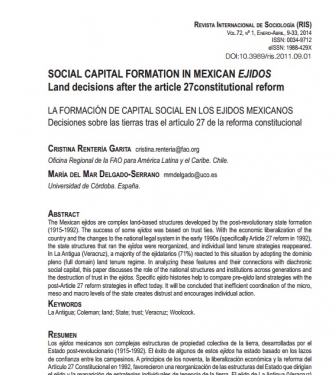Cristina Rentería Garita, María del Mar Delgado-Serrano
Revista Internacional de Sociología (RIS)
Vol. 72, No.1, Enero-Abril, 9-33, 2014
Abstract
The Mexican ejidos are complex land-based structures developed by the post-revolutionary state formation (1915-1992). The success of some ejidos was based on trust ties. With the economic liberalization of the country and the changes to the national legal system in the early 1990s (specifically Article 27 reform in 1992), the state structures that ran the ejidos were reorganized, and individual land tenure strategies reappeared. In La Antigua (Veracruz), a majority of the ejidatarios (71%) reacted to this situation by adopting the dominio pleno (full domain) land tenure regime. In analyzing these features and their connections with diachronic social capital, this paper discusses the role of the national structures and institutions across generations and the destruction of trust in the ejidos. Specific ejido histories help to compare pre-ejido land strategies with the post-Article 27 reform strategies in effect today. It will be concluded that inefficient coordination of the micro, meso and macro levels of the state creates distrust and encourages individual action.



